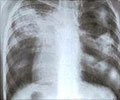General Information about Amniocentesis
Amniocentesis is the primary diagnostic procedure for antenatal diagnosis of genetic disorders. It is a simple medical procedure done during pregnancy for obtaining samples of the amniotic fluid. Amniotic fluid is the fluid that surrounds the fetus and provides a cushioning effect.
Also called simply as "Amnio" and is usually is done after 15 weeks of pregnancy. The procedure should be considered in the following situations:
- Women in their mid-30's and over, especially those who are pregnant for the first time.
- Women who have had a child with a chromosomal abnormality like Down syndrome in their previous pregnancies.
- Women with history of previous stillborn or spontaneous abortions.
- Women who have had a child with a neural tube defect such as spina-bifida.
- Women who know that either they or their spouse, have a family history of inherited disorders, which can be diagnosed.
- Women who have had exposure to radiation or chemotherapeutic agents
Babies of women with metabolic disorders are sometimes at risk with chromosomal abnormalities like,
- Autoimmune thyroditis
- Alpha-1 Antitrypsin deficiencies
- Diabetes mellitus












